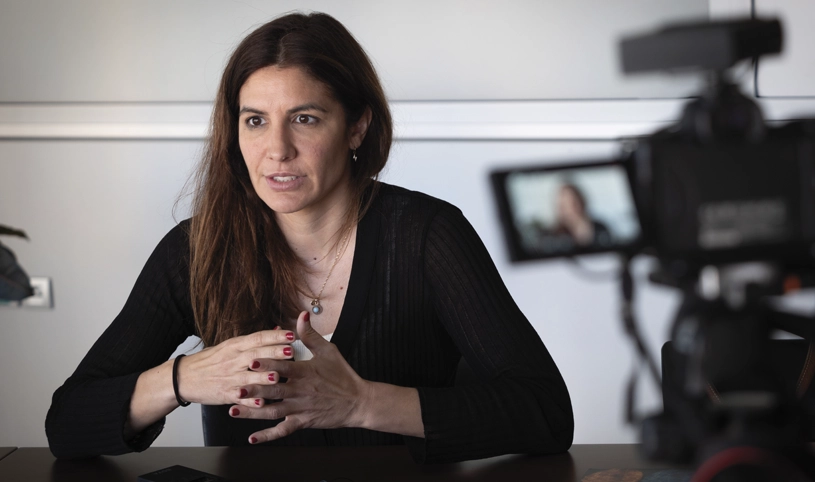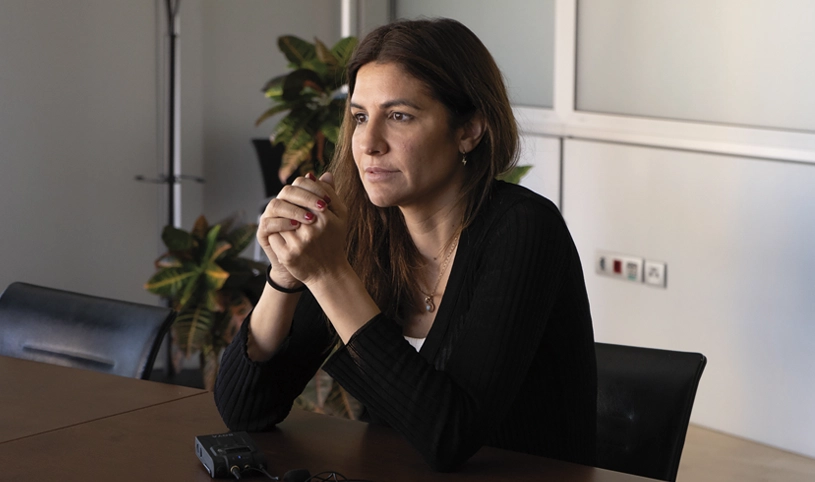Cristina García Cáceres: “Not everyone has to become a group leader; there are other Important roles”
Deputy Director and Head of Astrocyte-Neuron Network Unit

Dr Cristina García Cáceres began her career at the Helmholtz Munich Centre in 2012 after coming from the Autonomous University of Madrid, and in 2015 she became Head of Astrocyte-Neuron Network Unit at the Diabetes and Obesity Institute. Since then she has established and consolidated her own research group focussing on the study of the properties and physiological consequences of communication between neurons and astrocytes in order to understand the role of these glial cells in physiological and pathological aspects of brain function in the neuroendocrine control of metabolism. Her work has won prestigious awards like the ERC Starting Grant and constitutes a shift of paradigm on how glucose gets into the brain and how hypothalamic astrocytes tune sympathetic outflow towards cardiovascular target organs to control blood pressure. Within the CNIC Late Winter Seminar Programme on Cardiovascular Risk Factors and Brain Health, Cristina García Cáceres gave the seminar entitled “Beyond Neurons: Exploring Hunger Regulation in the Brain.”
How did your career as a researcher begin?
I completed my thesis at the Hospital Niño Jesús in Madrid under the supervision of Dr Julie Chowen and Dr. Jesús Argente. After a couple of fellowships in the United States and Sweden, I decided to do post-doctoral research abroad. I ended up in Germany, in Munich, first as a postdoctoral fellow and later as head of group. Now I am also a Professor at the University of LMU and associate director of the Institute for Obesity and Diabetes in Helmholtz Munich.
Really, I never thought I would end up in Munich. At first, I was just going to do a post-doc, but then everything seemed to just flow. Things went well for me. I got a grant, the ERC Starting Grant, which was the decisive step to consolidate my research group in Munich. They offered me a permanent contract there and funding possibilities to carry on my line of research and I went for it. And here I am.
And now it seems you’ve swapped the benchtop for an office?
That’s right, now they almost don’t want me in the lab, I get in the way. These last few years, I have focussed on training and consolidating my research group with experienced technicians who have been with me from the start, doctoral and post-doctoral students who are at different stages of their scientific career and writing their first theses and getting my first publications as head of group. In order to do this and continue in the same way, you need to continue applying for funding in the form of grants and projects. It’s a non-stop job that’s competitive and very demanding.
Do you get any training to do that?
It’s really quite self-taught. There are always mentors or people who have influenced your scientific career at key moments; they are your guides, have a lot more experience than you, have lived similar situations and can guide you. But most of it is self-taught. Each person has their own style or personality and way of seeing things, but nobody specifically teaches you how to write a grant application. Like they say, it’s trial and error; experience brings knowledge.
I studied a degree in biology, but I specialized in the branch of biomedicine. But when you finish your degree, you don’t have the training necessary to lead a group or the necessary tools to face what is coming. To a certain extent it is about knowing how to explain your research, even to people who don’t work in your area, and who see the potential in your studies to advance in scientific knowledge and its future applications. In general, we researchers don’t have that training. Fortunately, I think that at the moment students are being encouraged to take training courses about how to write a scientific article, how to give a talk, etc. You need to know how to transmit the importance of your studies, even for a non-scientific audience, but at the same time be rigorous and careful not to generate unreal expectations. We also have to remember the language barrier, since for most of us English is not our first language, which is an added difficulty for non-native speakers.
I was interested in biomedicine, particularly in areas that could have applications in advancing knowledge and even in treating patients
Could you give some advice to students about a career in science?
I don’t think so because every person and situation is different. But if they like research, I’d recommend exploring different possibilities and considering all of the options. Having doubts about what we like or the direction we want our career to take is normal. Of course, the decision to move abroad also depends on each individual’s personal circumstances, but it is true that having international experience can be beneficial when it comes to trying to go back home because internships abroad are valued, and even sometimes a requirement.
A career in science is one of continuous learning, with different stages, like the doctorate, the post-doc, consolidation and leading a research group. Not everyone has to become a group leader; there are also other important roles, such as that of a project manager, both in academia and the pharmaceutical industry. It is important to identify our strengths, interests and limitations, both professional and personal. You should never be afraid to explore new opportunities and try out new things, particularly when you are young. We often don’t know what we really like until we try it.
That’s why I encourage people to take on challenges and step outside their comfort zone because it can help us to discover what we are really looking for.
As a biologist, when you began your studies, did you think this was going to be your line of research?
I liked it and I really liked nature and animals. At that time I had also considered studying veterinary science or medicine. Biology has always been something I loved. But I wasn’t clear whether I wanted to do a thesis or a post-doc. At that time, I never thought about all of those possibilities.
I was interested in biomedicine, particularly in areas that could have applications in advancing knowledge and even in treating patients. But the reason I began my career as a researcher was by chance. During my degree, I had to do an internship in a laboratory and my mother, who at that time worked at the Hospital Niño Jesús, suggested that I could do it there. That’s where it all began; I did the laboratory internship, and I was offered the opportunity to prepare my end of degree dissertation. Later, the research group I had been with offered me the opportunity to work on my thesis.
Finally, I spent over 5 years completing the doctorate, which also gave me the chance to do internships abroad. That allowed me to find out how research is carried out in other places and encouraged me to consider the possibility of taking up a postdoctoral fellowship abroad.
Fortunately, I think that at the moment students are being encouraged to take training courses about how to write a scientific article, how to give a talk, etc.
¿Y cómo llega a su actual línea de investigación? El cerebro, la diabetes, la obesidad, etc.
Mi supervisora, la Dra. Julie Chowen, fue una de las pioneras en el estudio de los astrocitos en el hipotálamo, especialmente en relación con las enfermedades metabólicas. Durante mi investigación, exploramos temas como la diabetes tipo 1, el estrés prenatal y la respuesta hormonal, entre otros. Comencé a trabajar en este tipo de células durante ese tiempo, y hasta el día de hoy continúo haciéndolo.
Considero que esta experiencia fue crucial, ya que me permitió establecerme en un área de trabajo poco explorada. Trabajar en un campo poco conocido me abrió puertas para encontrar mi nicho. Cuando realizas un posdoctorado, es importante reconocer tu singularidad en comparación con otros investigadores, ya que somos muchos en el campo. Debes destacar en un área científica específica que represente tu trabajo. Por ejemplo, si te invitan a dar una charla, es porque otros científicos reconocen la relevancia de tu trabajo en un área específica y consideran que eres la persona indicada para hablar sobre ello. Tener experiencia en un área específica también es relevante al solicitar subvenciones, ya que demuestra tu idoneidad para llevar a cabo el trabajo propuesto, convirtiéndote en un valor seguro para el proyecto.

And how did you come to your current line of research? The brain, diabetes, obesity etc.
My supervisor, Dr Julie Chowen was one of the pioneers in the study of astrocytes in the hypothalamus, particularly in relation to metabolic diseases. During my research, we explored subjects such as type 1 diabetes, prenatal stress and hormonal response, among others. I began to work with this type of cell during that period and I still continue to do so.
I think that experience was crucial because it allowed me to establish myself in a relatively unexplored area of work. Working in a field that is not well known opened doors for me to find my niche. When you carry out postdoctoral research, it is important to understand your singularity compared to other researchers because there are a lot of us in the field. You should stand out in a specific scientific area that represents your work. For instance, if you are invited to give a talk, it’s because other scientists acknowledge the importance of your work in a specific area and consider you are the right person to speak about it. Having experience in a specific area is also important when it comes to applying for subsidies, since it shows your suitability to carry out the work you are proposing, making you a safe pair of hands for the project.
What are your current lines of research?
I focus on understanding how diabetes, obesity and other metabolic disorders can influence brain health in the long term. There is an increasing body of evidence indicating that resistance to insulin associated with obesity and type 2 diabetes not only affects the body on a peripheral level, causing cardiovascular changes and higher cardiovascular risk, but also has a significant impact on brain health, increasing the likelihood of suffering neurodegenerative and cognitive diseases in the future. In our research, we focus on exploring the relationship between metabolic health and brain health, because I consider that they are intrinsically related.
What is your opinion of CNIC?
I think the CNIC is a reference centre of scientific excellence in Spain for the study of cardiovascular diseases. Its scientists are highly recognized in the field and publish high-level research that significantly contributes to the advance of knowledge in this area.













